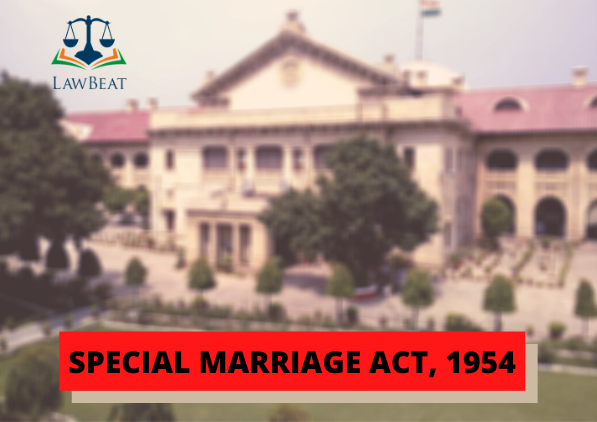Publication Of Notice For Intended Marriage Not Mandatory Under Special Marriage Act: Allahabad High Court

The Allahabad High Court recently held that the requirement of publication of notice under Section 6 and inviting objections under Section 7 of the Special Marriage Act, 1954 is directory in nature, and has to be given effect only on request of parties and not otherwise.
A single Judge bench of Hon’ble Justice Vivek Chaudhary observed that it shall be optional for parties when they give notice under Section 5 of the intended marriage, to make a request in writing to the Marriage Officer to publish or not to publish a notice under Section 6 and follow the procedure of objections as prescribed under the Act.
The Court noted that in case they do not make such a request for publication of notice in writing, while giving notice under Section 5 of the Act, the Marriage Officer shall not publish any such notice or entertain objections to the intended marriage and proceed with the solemnisation of the marriage.
The High Court reiterated the legal position in a petition filed by a young couple who solemnised their marriage under the Special Marriage Act, which requires publication of a notice for 30 days and invites objection by public at large.
The petitioner had stated that the right of life and personal liberty as well as the right to privacy of a large number of people were scuttled off by the above mentioned requirement.
The petitioner further contended that the personal laws do not ask for such requirements and therefore many who marry under the Special Marriage Act 1954 are suffering. The provision tends to invade their fundamental right to privacy and calls for unnecessary social pressure, the petitioner-couple contended.
The court went deep into the jurisprudential aspect of the Special Marriage Act where, in the year 1872, there was a requirement of complete renouncement of the religion to be able to get married under the Special Marriage Act.
Later, in the year 1923 this requirement was deleted. In 1954, the procedure of sections 6 and 7 were included with minor variations in the Act.
Taking into account the factual matrix in the present case, the court, cited various judgments of Apex Court and also the Law Commission report of 2008 and 2012 (still pending for consideration) that, “the object of a law whether personal or public, must be to sustain the stability of society and help its progress”
Looking into the development of Law since the judgment delivered in Lata Singh v. State of UP(the initial case) till Navtej Singh Johar Case, including the judgment on the right to privacy (KS Puttaswamy Case, in terms of which the court noted,
“..the choice of an individual is an inextricable part. Right to choose a life partner, to be a fundamental right recognized under article 19 and 21of the Constitution. Once the said fundamental right is inherent in a person, the same cannot be scuttled.”
The court further observed that it would be unethical and cruel to force the present generation living with it's current needs and expectations to follow the custom.
It was however clarified that,
"It goes without saying that it shall be open for the Marriage Officer, while solemnising any marriage under the Act of 1954, to verify the identification, age and valid consent of the parties or otherwise their competence to marry under the said Act.”
The court also held, that since the matter relates to protection of fundamental rights of large number of persons, hence the Chief Secretary of the State of U.P. must be notified soon, who shall forthwith communicate the same to all the Marriage Officers of the State and other concerned authorities as expeditiously as possible.
